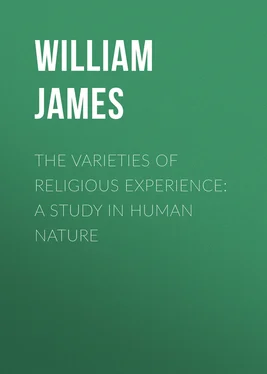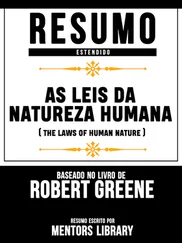William James - The Varieties of Religious Experience - A Study in Human Nature
Здесь есть возможность читать онлайн «William James - The Varieties of Religious Experience - A Study in Human Nature» — ознакомительный отрывок электронной книги совершенно бесплатно, а после прочтения отрывка купить полную версию. В некоторых случаях можно слушать аудио, скачать через торрент в формате fb2 и присутствует краткое содержание. Жанр: foreign_prose, foreign_religion, Философия, foreign_psychology, foreign_antique, на английском языке. Описание произведения, (предисловие) а так же отзывы посетителей доступны на портале библиотеки ЛибКат.
- Название:The Varieties of Religious Experience: A Study in Human Nature
- Автор:
- Жанр:
- Год:неизвестен
- ISBN:нет данных
- Рейтинг книги:4 / 5. Голосов: 1
-
Избранное:Добавить в избранное
- Отзывы:
-
Ваша оценка:
- 80
- 1
- 2
- 3
- 4
- 5
The Varieties of Religious Experience: A Study in Human Nature: краткое содержание, описание и аннотация
Предлагаем к чтению аннотацию, описание, краткое содержание или предисловие (зависит от того, что написал сам автор книги «The Varieties of Religious Experience: A Study in Human Nature»). Если вы не нашли необходимую информацию о книге — напишите в комментариях, мы постараемся отыскать её.
The Varieties of Religious Experience: A Study in Human Nature — читать онлайн ознакомительный отрывок
Ниже представлен текст книги, разбитый по страницам. Система сохранения места последней прочитанной страницы, позволяет с удобством читать онлайн бесплатно книгу «The Varieties of Religious Experience: A Study in Human Nature», без необходимости каждый раз заново искать на чём Вы остановились. Поставьте закладку, и сможете в любой момент перейти на страницу, на которой закончили чтение.
Интервал:
Закладка:
William James
The Varieties of Religious Experience: A Study in Human Nature
Preface
This book would never have been written had I not been honored with an appointment as Gifford Lecturer on Natural Religion at the University of Edinburgh. In casting about me for subjects of the two courses of ten lectures each for which I thus became responsible, it seemed to me that the first course might well be a descriptive one on “Man's Religious Appetites,” and the second a metaphysical one on “Their Satisfaction through Philosophy.” But the unexpected growth of the psychological matter as I came to write it out has resulted in the second subject being postponed entirely, and the description of man's religious constitution now fills the twenty lectures. In Lecture XX Конец ознакомительного фрагмента. Текст предоставлен ООО «ЛитРес». Прочитайте эту книгу целиком, купив полную легальную версию на ЛитРес. Безопасно оплатить книгу можно банковской картой Visa, MasterCard, Maestro, со счета мобильного телефона, с платежного терминала, в салоне МТС или Связной, через PayPal, WebMoney, Яндекс.Деньги, QIWI Кошелек, бонусными картами или другим удобным Вам способом.
I have suggested rather than stated my own philosophic conclusions, and the reader who desires immediately to know them should turn to pages 511-519 Конец ознакомительного фрагмента. Текст предоставлен ООО «ЛитРес». Прочитайте эту книгу целиком, купив полную легальную версию на ЛитРес. Безопасно оплатить книгу можно банковской картой Visa, MasterCard, Maestro, со счета мобильного телефона, с платежного терминала, в салоне МТС или Связной, через PayPal, WebMoney, Яндекс.Деньги, QIWI Кошелек, бонусными картами или другим удобным Вам способом.
, and to the “Postscript” of the book. I hope to be able at some later day to express them in more explicit form.
In my belief that a large acquaintance with particulars often makes us wiser than the possession of abstract formulas, however deep, I have loaded the lectures with concrete examples, and I have chosen these among the extremer expressions of the religious temperament. To some readers I may consequently seem, before they get beyond the middle of the book, to offer a caricature of the subject. Such convulsions of piety, they will say, are not sane. If, however, they will have the patience to read to the end, I believe that this unfavorable impression will disappear; for I there combine the religious impulses with other principles of common sense which serve as correctives of exaggeration, and allow the individual reader to draw as moderate conclusions as he will.
My thanks for help in writing these lectures are due to Edwin D. Starbuck, of Stanford University, who made over to me his large collection of manuscript material; to Henry W. Rankin, of East Northfield, a friend unseen but proved, to whom I owe precious information; to Theodore Flournoy, of Geneva, to Canning Schiller, of Oxford, and to my colleague Benjamin Rand, for documents; to my colleague Dickinson S. Miller, and to my friends, Thomas Wren Ward, of New York, and Wincenty Lutoslawski, late of Cracow, for important suggestions and advice. Finally, to conversations with the lamented Thomas Davidson and to the use of his books, at Glenmore, above Keene Valley, I owe more obligations than I can well express.
Harvard University,
March, 1902.
Lecture I. Religion And Neurology
It is with no small amount of trepidation that I take my place behind this desk, and face this learned audience. To us Americans, the experience of receiving instruction from the living voice, as well as from the books, of European scholars, is very familiar. At my own University of Harvard, not a winter passes without its harvest, large or small, of lectures from Scottish, English, French, or German representatives of the science or literature of their respective countries whom we have either induced to cross the ocean to address us, or captured on the wing as they were visiting our land. It seems the natural thing for us to listen whilst the Europeans talk. The contrary habit, of talking whilst the Europeans listen, we have not yet acquired; and in him who first makes the adventure it begets a certain sense of apology being due for so presumptuous an act. Particularly must this be the case on a soil as sacred to the American imagination as that of Edinburgh. The glories of the philosophic chair of this university were deeply impressed on my imagination in boyhood. Professor Fraser's Essays in Philosophy, then just published, was the first philosophic book I ever looked into, and I well remember the awe-struck feeling I received from the account of Sir William Hamilton's class-room therein contained. Hamilton's own lectures were the first philosophic writings I ever forced myself to study, and after that I was immersed in Dugald Stewart and Thomas Brown. Such juvenile emotions of reverence never get outgrown; and I confess that to find my humble self promoted from my native wilderness to be actually for the time an official here, and transmuted into a colleague of these illustrious names, carries with it a sense of dreamland quite as much as of reality.
But since I have received the honor of this appointment I have felt that it would never do to decline. The academic career also has its heroic obligations, so I stand here without further deprecatory words. Let me say only this, that now that the current, here and at Aberdeen, has begun to run from west to east, I hope it may continue to do so. As the years go by, I hope that many of my countrymen may be asked to lecture in the Scottish universities, changing places with Scotsmen lecturing in the United States; I hope that our people may become in all these higher matters even as one people; and that the peculiar philosophic temperament, as well as the peculiar political temperament, that goes with our English speech may more and more pervade and influence the world.
As regards the manner in which I shall have to administer this lectureship, I am neither a theologian, nor a scholar learned in the history of religions, nor an anthropologist. Psychology is the only branch of learning in which I am particularly versed. To the psychologist the religious propensities of man must be at least as interesting as any other of the facts pertaining to his mental constitution. It would seem, therefore, that, as a psychologist, the natural thing for me would be to invite you to a descriptive survey of those religious propensities.
If the inquiry be psychological, not religious institutions, but rather religious feelings and religious impulses must be its subject, and I must confine myself to those more developed subjective phenomena recorded in literature produced by articulate and fully self-conscious men, in works of piety and autobiography. Interesting as the origins and early stages of a subject always are, yet when one seeks earnestly for its full significance, one must always look to its more completely evolved and perfect forms. It follows from this that the documents that will most concern us will be those of the men who were most accomplished in the religious life and best able to give an intelligible account of their ideas and motives. These men, of course, are either comparatively modern writers, or else such earlier ones as have become religious classics. The documents humains which we shall find most instructive need not then be sought for in the haunts of special erudition—they lie along the beaten highway; and this circumstance, which flows so naturally from the character of our problem, suits admirably also your lecturer's lack of special theological learning. I may take my citations, my sentences and paragraphs of personal confession, from books that most of you at some time will have had already in your hands, and yet this will be no detriment to the value of my conclusions. It is true that some more adventurous reader and investigator, lecturing here in future, may unearth from the shelves of libraries documents that will make a more delectable and curious entertainment to listen to than mine. Yet I doubt whether he will necessarily, by his control of so much more out-of-the-way material, get much closer to the essence of the matter in hand.
Читать дальшеИнтервал:
Закладка:
Похожие книги на «The Varieties of Religious Experience: A Study in Human Nature»
Представляем Вашему вниманию похожие книги на «The Varieties of Religious Experience: A Study in Human Nature» списком для выбора. Мы отобрали схожую по названию и смыслу литературу в надежде предоставить читателям больше вариантов отыскать новые, интересные, ещё непрочитанные произведения.
Обсуждение, отзывы о книге «The Varieties of Religious Experience: A Study in Human Nature» и просто собственные мнения читателей. Оставьте ваши комментарии, напишите, что Вы думаете о произведении, его смысле или главных героях. Укажите что конкретно понравилось, а что нет, и почему Вы так считаете.












